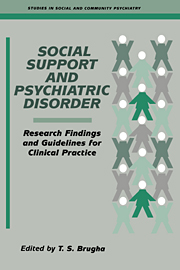Book contents
- Frontmatter
- Contents
- Preface
- List of contributors
- 1 Social support and psychiatric disorder: overview of evidence
- PART I CONCEPTS AND ORIGINS OF SOCIAL SUPPORT
- 2 Understanding social support within the context of theory and research on the relationship of life stress and mental health
- 3 A developmental perspective on social support networks
- 4 Cognitive aspects of social support processes
- 5 Attachment, cooperation and rank: the evolution of the need for status and social support
- PART II LESSONS FROM SELECTED OBSERVATIONAL STUDIES
- PART III LESSONS FROM INTERVENTION STUDIES
- PART IV INTERVENTION PRINCIPLES AND RECOMMENDATIONS
- Index
3 - A developmental perspective on social support networks
from PART I - CONCEPTS AND ORIGINS OF SOCIAL SUPPORT
Published online by Cambridge University Press: 31 October 2009
- Frontmatter
- Contents
- Preface
- List of contributors
- 1 Social support and psychiatric disorder: overview of evidence
- PART I CONCEPTS AND ORIGINS OF SOCIAL SUPPORT
- 2 Understanding social support within the context of theory and research on the relationship of life stress and mental health
- 3 A developmental perspective on social support networks
- 4 Cognitive aspects of social support processes
- 5 Attachment, cooperation and rank: the evolution of the need for status and social support
- PART II LESSONS FROM SELECTED OBSERVATIONAL STUDIES
- PART III LESSONS FROM INTERVENTION STUDIES
- PART IV INTERVENTION PRINCIPLES AND RECOMMENDATIONS
- Index
Summary
Despite the enormous amount of interest in the links between mental health and social support, a developmental perspective is sadly lacking. Most of the attention has been focused on cross-sectional associations at one point in time or, at best, longitudinal studies confined to a short period in one life stage. Adulthood has received the most attention, and indeed it will be the focus of this book; however, adulthood itself is a life stage in which development occurs. Too often the adult years are studied as though they were a uniform period where the myriad of crucial transitions between 18 and 60 are not considered.
This chapter will consider how supportive relationships develop from birth through to the adult years, focusing on how experiences in each preceding life stage influence what happens next. In this sense we will be concerned with social pathways through the life course. The aim is to consider social support as a developmental phenomenon in the hope that this can promote more effective understanding of the topic and facilitate better clinical research and intervention in the mental health field.
Social support from a developmental perspective: the individual, the environment and the interaction
The aim of this chapter is to take a life-span developmental perspective on the study of social support in all its aspects (Schulz & Rau, 1985; Thompson & Lamb, 1986; Bakes et al., 1980). The first task is to say something about what is meant by the concept of social support from this perspective.
Keywords
- Type
- Chapter
- Information
- Social Support and Psychiatric DisorderResearch Findings and Guidelines for Clinical Practice, pp. 61 - 95Publisher: Cambridge University PressPrint publication year: 1995
- 2
- Cited by

